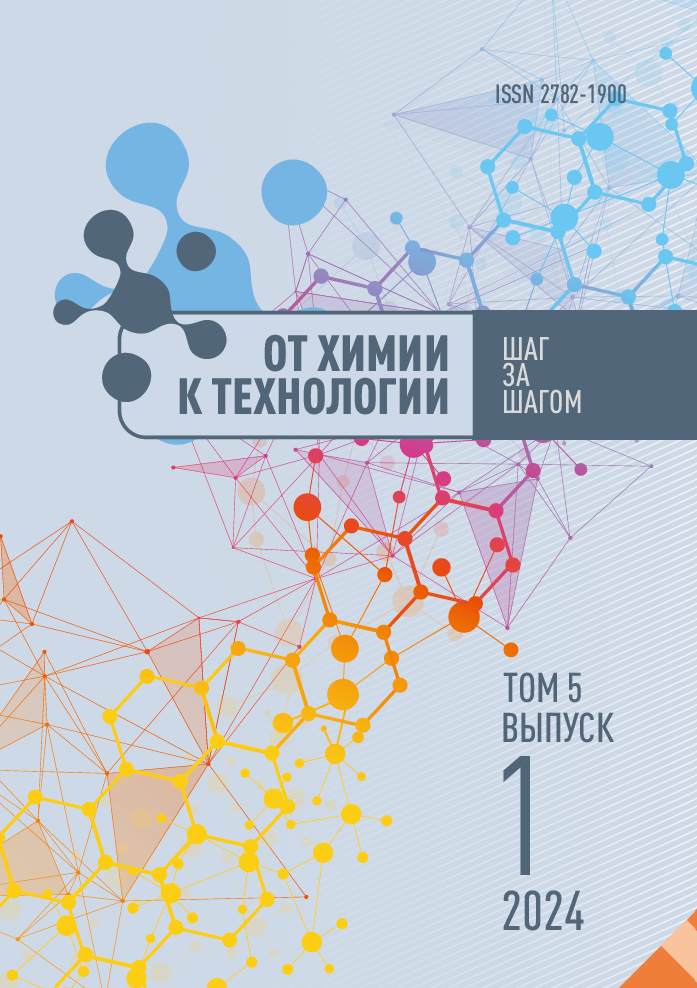Yaroslavl, Yaroslavl, Russian Federation
Yaroslavl, Yaroslavl, Russian Federation
Yaroslavl, Yaroslavl, Russian Federation
Yaroslavl, Yaroslavl, Russian Federation
Yaroslavl, Yaroslavl, Russian Federation
Yaroslavl, Yaroslavl, Russian Federation
The paper considers the results of synthesis, elemental analysis, and spectroscopic methods (IR, UV-vis) of four new copper(II) complexes with anions of 1-adamantanecarboxylic acid, 4-(1-adamantyl)benzoic acid and their L-valine derivatives as ligands. Based on the obtained spectral data, the authors assumed the biyaderic structure of these complexes with bidentate coordination of carboxylate ligands of the type [Cu2+2(RCOO-)4(H2O)2], with RCOO-as carboxylate ligands. The synthesised compounds are of interest as low toxic potential therapeutic agents with anti-inflammatory and anti-cancer activity.
copper(II) carboxylate complexes, 1-adamantane carboxylic acid, 4-(1-adamantyl)benzoic acid, biuclear complexes
1. Medici, S., Peana, M., Nurchi, V.M., Lachowicz, J.I., Crisponi, G. & Zoroddu, M.A. (2015) Noble metals in medicine: Latest advances, Coord. Chem. Rev., 284, pp. 329-350. DOI:https://doi.org/10.1016/j.ccr.2014.08.002.
2. Ruiz-Azuara, L. & Bravo-Gomez, M.E. (2010) Copper Compounds in Cancer Chemotherapy, Curr. Med. Chem., 17, pp. 3606-3615. DOI:https://doi.org/10.2174/092986710793213751.
3. Fernandes, P., Sousa, I., Cunha-Silva, L., Ferreira, M., de Castro, B., Pereira, E.F., Feio, M.J. & Gameiro, P. (2014) Synthesis, characterization and antibacterial studies of a copper(II) lomefloxacin ternary complex, J. Inorg. Biochem., 131, pp. 21-29. DOI:https://doi.org/10.1016/j.jinorgbio.2013.10.013.
4. Martins, D.A., Gouvea, L.R., da Gama Jean Batista, D., da Silva, P.B., Louro, S.R.W., de Nazaré, C., Soeiro, M. & Teixeira, L.R. (2012) Copper(II)–fluoroquinolone complexes with anti-Trypanosoma cruzi activity and DNA binding ability, Biometals, 25, pp. 951-960. DOI:https://doi.org/10.1007/s10534-012-9565-3.
5. Perontsis, S., Hatzidimitriou, A.G., Begou, O.-A., Papadopoulos, A.N. & Psomas, G. (2016) Characterization and biological properties of copper(II)-ketoprofen complexes, J. Inorg. Biochem., 162, pp. 22-30. DOI:https://doi.org/10.1016/j.jinorgbio.2016.06.001.
6. Psomas, G. (2020) Copper(II) and zinc(II) coordination compounds of non-steroidal anti-inflammatory drugs: Structural features and antioxidant activity, Coord. Chem. Rev., 412, 213259. DOI:https://doi.org/10.1016/j.ccr.2020.213259.
7. Jeong, Y.W., Kim, K.S., Oh, J.Y., Park, J.C., Bang, J.H., Choi, S.W. & Lee, J.C. (2003) Growth Inhibition and Apoptosis Induction of Gastric Cancer Cells by Copper (II) Glycinate Complex, J. Microbiol. Biotechnol., 13, pp. 394-399 [online]. Available at: https://www.jmb.or.kr/journal/download_pdf.php?spage=394&volume=13&number=3 (accessed 12.01.2024)
8. Iglesias, S., Alvarez, N., Torre, M.H., Kremer, E., Ellena, J., Ribeiro, R.R., Barroso, R.P., Costa-Filho, A.J., Kramer, G.M. & Facchin, G. (2014) Synthesis, structural characterization and cytotoxic activity of ternary Copper(II)-dipeptide-phenanthroline complexes. A step towards the development of new copper compounds for the treatment of cancer, J. Inorg. Biochem., 139, pp. 117-123. DOI:https://doi.org/10.1016/j.jinorgbio.2014.06.007.
9. Fernández, C.Y., Alvarez, N., Rocha, A., Ellena, J., Costa-Filho, A.J., Batista, A.A. & Facchin, G. (2023) New Copper(II)-L-Dipeptide-Bathophenanthroline Complexes as Potential Anticancer Agents — Synthesis, Characterization and Cytotoxicity Studies – And Comparative DNA-Binding Study of Related Phen Complexes, Molecules, 28, 896. DOI:https://doi.org/10.3390/molecules28020896.
10. Banti, C.N. & Hadjikakou, S.K. (2016) Non-Steroidal Anti-Inflammatory Drugs (NSAIDs) in Metal Complexes and Their Effect at the Cellular Level, Eur. J. Inorg. Chem., 2016, pp. 3048-3071. DOI:https://doi.org/10.1002/ejic.201501480.
11. Krstić, N.S., Nikolić, R.S., Stanković, M.N., Nikolić, N.G. & Đorđević, D.M. (2015) Coordination Compounds of M(II) Biometal Ions with Acid-Type Anti-inflammatory Drugs as Ligands – A Review, Trop. J. Pharm. Res., 14, pp. 337-349. DOI:https://doi.org/10.4314/tjpr.v14i2.21.
12. Malis, G., Geromichalou, E., Geromichalos, G.D., Hatzidimitriou, A.G. & Psomas, G. (2021) Copper(II) complexes with non-steroidal anti-inflammatory drugs: Structural characterization, in vitro and in silico biological profile, J. Inorg. Biochem., 224, 111563. DOI:https://doi.org/10.1016/j.jinorgbio.2021.111563.
13. Krasnikov, S.V., Obuchova, T.A., Yasinskii O.A. & Balakin, K.V. (2004) Synthesis of amino acid derivatives of 4-(l-adamantyl)benzoic acid obtained by transition metal ion catalyzed oxidation of 4-(l-adamantyl)toluene, Tetrahedron Lett., 4, pp. 711-714. DOI:https://doi.org/10.1016/j.tetlet.2003.11.057.
14. Spiridonova, A.V., Uvarovskaya, P.A., Krasnikova, N.V., Krasnikov, S.V. & Rozaeva, E.E. (2021) Short N-acyldipeptides with adamantylbenzoyl fragment with potential antiviral activity, From Chemistry towards Technology Step-By-Step, 2(2), pp. 60-68. DOI:https://doi.org/10.52957/27821900_2021_02_60 [online]. Available at: http://chemintech.ru/index.php/tor/issue/view/2021-2-2 (in Russian) (accessed 24.12.2023)
15. Wanka, L., Iqbal, K. & Schreiner, P.R. (2013) The Lipophilic Bullet Hits the Targets: Medicinal Chemistry of Adamantane Derivatives, Chem. Rev., 113, pp. 3516-3604. DOI:https://doi.org/10.1021/cr100264t.
16. Corradi, A. (1992) Structures and stabilities of metal(II) (Co(II), Ni(II), Cu(II), Zn(II), Pd(II), Cd(II)) compounds of N-protected aminoacids, Coord. Chem. Rev., 45, pp. 45-98. DOI:https://doi.org/10.1016/0010-8545(92)80020-R.
17. Marcotrigiano, G.O., Menabue, L. & Pellacani, G.C. (1980) (N-acetyl-DL-valinate)copper(II) complexes: effect of amines on the amino acid coordination, Inorg. Chim. Acta., 46, pp. 107-112. DOI:https://doi.org/10.1016/S0020-1693(00)84177-8.
18. Lutsenko, I.A., Baravikov, D.E., Koshenskova, K.A., Kiskin, M.A., Nelyubina, Y.V., Primakov, P.V., Voronina, Y.K., Garaeva, V.V., Aleshin, D.A., Aliev, T.M., Danilenko, V.N., Bekker, O.B. & Eremenko, I.L. (2022) What are the prospects for using complexes of copper(II) and zinc(II) to suppress the vital activity of Mycolicibacterium smegmatis? RSC Adv., 12, pp. 5173-5183. DOI:https://doi.org/10.1039/d1ra08555g.
19. Nakamoto, K. (2009) Infrared and Raman Spectra of Inorganic and Coordination Compounds, Part B: Applications in Coordination, Organometallic, and Bioinorganic Chemistry, 6th Edition. John Wiley & Sons, Inc.
20. Kumar, S., Garg, S., Sharma, R.P., Venugopalan, P., Tenti, L., Ferretti, V., Nivelle, L., Tarpin, M. & Guillon, E. (2017) Four monomeric copper(ii) complexes of non-steroidal anti-inflammatory drug Ibuprofen and N-donor ligands: syntheses, characterization, crystal structures and cytotoxicity studies, New J. Chem., 41, pp. 8253-8262. DOI:https://doi.org/10.1039/c7nj00247e.
21. Hadjiivanov, K.I., Panayotov, D.A., Mihaylov, M.Y., Ivanova, E.Z., Chakarova, K.K., Andonova, S.M. & Drenchev, N.L. (2021) Power of Infrared and Raman Spectroscopies to Characterize Metal-Organic Frameworks and Investigate Their Interaction with Guest Molecules, Chem. Rev., 121, pp. 1286-1424. DOI:https://doi.org/10.1021/acs.chemrev.0c00487.
22. Catterick, J. & Thornton, P. (1977) Structures and physical properties of polynuclear carboxylates, Adv. Inorg. Chem. Radiochem., 20, pp. 291-362. DOI:https://doi.org/10.1016/S0065-2792(08)60041-2.
23. Dimiza, F., Fountoulaki, S., Papadopoulos, A.N., Kontogiorgis, C.A., Tangoulis, V., Raptopoulou, C.P., Psycharis, V., Terzis, A., Kessissoglou, D.P. & Psomas, G. (2011) Non-steroidal antiinflammatory drug–copper(II) complexes: Structure and biological perspectives, Dalton Trans., 40, pp. 8555-8568. DOI:https://doi.org/10.1039/c1dt10714c.
24. Shahabadi, N. & Shiri, F. (2017) Multispectroscopic Studies on the Interaction of a Copper(II) Complex of Ibuprofen Drug with Calf Thymus DNA, Nucleosides, Nucleotides & Nucleic Acids., 36, pp. 83-106. DOI:https://doi.org/10.1080/15257770.2016.1223305.
25. Deacon, G.B. & Philips, R.J. (1980) Relationships between the carbon-oxygen stretching frequencies of carboxylato complexes and the type of carboxylate coordination, Coord. Chem. Rev., 33, pp. 227-250. DOI:https://doi.org/10.1016/S0010-8545(00)80455-5.
26. Moiseev, I.K., Makarova, N.V. & Zemtsova, M.N. Reactions of adamantanes in electrophilic media, (1999) Russ. Chem. Rev., 68, pp. 1001-1020. DOI:https://doi.org/10.1070/rc1999v068n12abeh000495.







